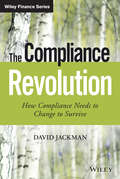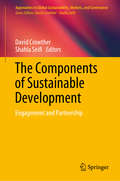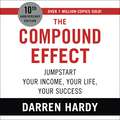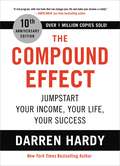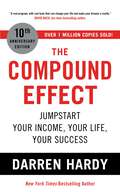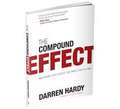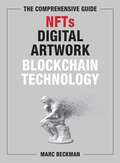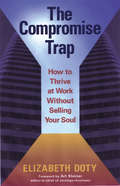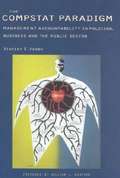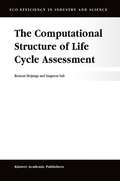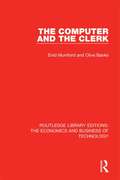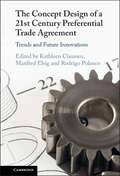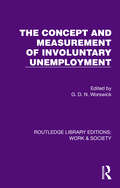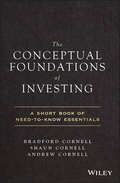- Table View
- List View
The Compliance Revolution
by David JackmanThe Compliance Revolution--Practical, Powerful Changes for Strategic Organizational Value Compliance is absolutely critical in creating a robust and resilient organization, one which is trusted by clients and contributes to market stability. Firms must approach compliance differently in order to meet these standards. Written for compliance staff, regulatory organizations, and senior management, The Compliance Revolution explains how key changes in compliance affect underlying principles, practices, roles, expectations and values. This valuable resource for global practitioners assists in navigating compliance requirements and implementing solid protection for a sound organization. Author David Jackman presents a coherent model for understanding and applying key developments in regulation and compliance. While the model is based on financial services, it can be applied to any sector and industry. It identifies five critical compliance components: Start-up, crises, expansion, sustainability, and outcomes-led focus. You will also discover: Why compliance is worth spending money on What your firm could and should be doing differently The importance of ethics in compliance and regulatory challenges How to create a pro-compliance culture Ten principles of good governance and why good governance matters How to employ judgment-based compliance The features and benefits of corporate maturity The Compliance Revolution is a crucial asset for all those with stakes in compliance--board members, compliance managers, and employees. David Jackman outlines key compliance challenges and reveals the practical tools and techniques required for successful practice. The insight, examples, and strategies in this comprehensive guidebook will help you and your organization achieve increasingly efficient, substantially more effective compliance procedures and practices.
The Components of Sustainable Development: Engagement and Partnership (Approaches to Global Sustainability, Markets, and Governance)
by David Crowther Shahla SeifiThis book focuses on the application of sustainable development principles through consultation with, and partnerships between commerce and the community. Offering international perspectives, the authors show that the issues are global and that we can best arrive at solutions through a synthesis of these various perspectives. The book also examines changes to corporate and institutional behavior and discusses the extent to which the focus has changed, making it necessary to consider new approaches to our understanding of sustainability and differing effects in practice.This approach is based on the tradition of the Social Responsibility Research Network, which in its 17-year history has sought to broaden the discourse and to treat all research as inter-related and relevant to business. This book consists of the best contributions from the 17th International Conference on Corporate Social Responsibility and 8th Organisational Governance Conference, held in Bangalore, India in September 2018
The Composable Enterprise: A Gamechanger for Organisations, Digitisation and Business Software
by August-Wilhelm ScheerThe benefits of digitalisation do not lie in the use of new technologies for existing processes, but in organisational changes and new business models. The book highlights the composable enterprise as the guiding principle for successful digital transformation and associated cost reductions and revenue increases. What does it mean? A composable enterprise is organised in a decentralised process-oriented way. This allows the enterprise to react quickly to new situations, develop or change processes and business models. The information systems are based on platform architectures. A paradigm shift to monolithic applications.Sector concepts for industry, consulting and universities show how organisation and application architectures interlock in the composable enterprise.The reader receives inspiration, a foundation and a compass for the digital transformation of a company to the composable enterprise.
The Composition Matters: Capital Inflows and Liquidity Crunch During a Global Economic Crisis
by Shang-Jin Wei Hui TongA report from the International Monetary Fund.
The Composition of Fiscal Adjustment and Growth
by G. A. Mackenzie David W. H. Orsmond Philip R. Gerson#Includes bibliographical references.
The Compound Effect
by Darren Hardy LLCNo gimmicks. No hyperbole. Finally, just the truth on what it takes to earn successAs the central curator of the success media industry for over 25 years, author Darren Hardy has heard it all, seen it all, and tried most of it. This book reveals the core principles that drive success. The Compound Effect contains the essence of what every superachiever needs to know, practice, and master to obtain extraordinary success. Inside you will find strategies on:How to win--every time! The No. 1 strategy to achieve any goal and triumph over any competitor, even if they're smarter, more talented or more experienced. Eradicating your bad habits (some you might be unaware of!) that are derailing your progress. Painlessly installing the few key disciplines required for major breakthroughs. The real, lasting keys to motivation--how to get yourself to do things you don't feel like doing. Capturing the elusive, awesome force of momentum. Catch this, and you'll be unstoppable. The acceleration secrets of superachievers. Do they have an unfair advantage? Yes, they do, and now you can too!If you're serious about living an extraordinary life, use the power of The Compound Effect to create the success you desire. Begin your journey today!(P) 2019 Folio Literary Management
The Compound Effect: Jumpstart Your Income, Your Life, Your Success
by Darren HardyDo you want success? More success than you have now? And even more success than you ever imagined possible? That is what this book is about. Achieving it.No gimmicks. No hyperbole. Finally, just the truth on what it takes to earn successAs the central curator of the success media industry for over 25 years, author Darren Hardy has heard it all, seen it all, and tried most of it. This book reveals the core principles that drive success. The Compound Effect contains the essence of what every superachiever needs to know, practice, and master to obtain extraordinary success. Inside you will find strategies on:How to win--every time! The No. 1 strategy to achieve any goal and triumph over any competitor, even if they're smarter, more talented or more experienced.Eradicating your bad habits (some you might be unaware of!) that are derailing your progress.Painlessly installing the few key disciplines required for major breakthroughs.The real, lasting keys to motivation--how to get yourself to do things you don't feel like doing.Capturing the elusive, awesome force of momentum. Catch this, and you'll be unstoppable.The acceleration secrets of superachievers. Do they have an unfair advantage? Yes, they do, and now you can too!If you're serious about living an extraordinary life, use the power of The Compound Effect to create the success you desire. Begin your journey today!
The Compound Effect: Jumpstart Your Income, Your Life, Your Success - the million copy bestseller revealing the secrets of superachievers
by Darren Hardy LLCNO GIMMICKS. NO HYPERBOLE. FINALLY, JUST THE TRUTH ON WHAT IT TAKES TO EARN SUCCESS AND JOIN THE RANKS OF THE SUPERACHIEVERS "A brilliant formula for living an extraordinary life. Read it, and most important, take action upon it!" - Jack Canfield, co-author of The Success Principles: How to Get from Where You Are to Where You Want to Be Do you want success?More success than you have now?And even more success than you ever imagined possible?That is what this book is about. Achieving it.As the central curator of the success media industry for over 25 years, author Darren Hardy has heard it all, seen it all, and tried most of it. This book reveals the core principles that drive success. The Compound Effect contains the essence of what every superachiever needs to know, practice, and master to obtain extraordinary success. You'll learn how to:* Win every time using the No. 1 strategy to achieve any goal and triumph over any competitor, even if they're smarter, more talented or more experienced.* Eradicate bad habits that are derailing your progress.* Painlessly install the few key disciplines required for major breakthroughs.* Secure lasting motivation, ensuring you do the things you don't feel like doing.* Capture the elusive, awesome force of momentum. Catch this, and you'll be unstoppable.* Master the acceleration secrets of superachievers. Do they have an unfair advantage? Yes, they do, and now you will too!If you're serious about living an extraordinary life, use the power of The Compound Effect to create the success you desire.Here's what reviewers are saying:⭐⭐⭐⭐⭐ "Resonated deeply and I am genuinely excited to face the challenges I had been avoiding. Life changer."⭐⭐⭐⭐⭐ "One of those books I plan to read every year"⭐⭐⭐⭐⭐ "Hardy's insights offer a roadmap for long-term success."
The Compound Effect: Multiplying Your Success, One Simple Step At A Time
by Darren HardyNo gimmicks. No Hyperbole. No Magic Bullet. The Compound Effect is based on the principle that decisions shape your destiny. Little, everyday decisions will either take you to the life you desire or to disaster by default. Darren Hardy, publisher of Success Magazine, presents The Compound Effect, a distillation of the fundamental principles that have guided the most phenomenal achievements in business, relationships, and beyond. This easy-to-use, step-by-step operating system allows you to multiply your success, chart your progress, and achieve any desire. If you're serious about living an extraordinary life, use the power of The Compound Effect to create the success you want.
The Compound Effect: Multiplying Your Success, One Simple Step at a Time
by Darren HardyAs publisher of SUCCESS magazine, author Darren Hardy has heard it all, seen it all, and tried most of it. This book reveals the core principles that drive success. The Compound Effect contains the essence of what every super achiever needs to know, practice, and master to obtain extraordinary success. Inside you will find strategies on: - How to win every time! The No. 1 strategy to achieve any goal and triumph over any competitor, even if they're smarter, more talented or more experienced. - Eradicating your bad habits (some you might be unaware of!) that are derailing your progress. - Painlessly installing the few key disciplines required for major breakthroughs. - The real, lasting keys to motivation, how to get yourself to do things you don't feel like doing. - Capturing the elusive, awesome force of momentum. Catch this, and you'll be unstoppable. - The acceleration secrets of super achievers. Do they have an unfair advantage? Yes they do, and now you can too! If you're serious about living an extraordinary life, use the power of The Compound Effect to create the success you desire. Begin your journey today!
The Compound Effect: द कम्पाउंड इफ़ेक्ट
by Darren Hardy Sudhir Dixitक्या आप सफलता चाहते हैं? वर्तमान से ज़्यादा सफलता? और अपनी कल्पना से भी ज़्यादा सफलता? यह पुस्तक इसी बारे में है। यह ऐसी ही सफलता हासिल करने के बारे में है। सक्सेस मैग्ज़ीन के प्रकाशक के रूप में लेखक डैरेन हार्डी ने सफल लोगों को बहुत नज़दीक से देखा और समझा है। यह पुस्तक सफलता दिलाने वाले बुनियादी सिद्धांतों को उजागर करती है। असाधारण सफलता हासिल करने के लिए इंसान को क्या जानना चाहिए, किन चीज़ों का अभ्यास करना चाहिए और किनमें माहिर बनना चाहिए, इस पुस्तक में यह सब कुछ बताया गया है। इसमें आप जानेंगे: हर बार कैसे जीतें! किसी भी लक्ष्य को हासिल करने और किसी भी प्रतिस्पर्धी पर विजय पाने की नंबर 1 रणनीति, भले ही वे ज़्यादा बुद्धिमान, ज़्यादा योग्य या ज़्यादा अनुभवी हों अपनी बुरी आदतों से छुटकारा पाना (जिनमें से कुछ के बारे में आप स्वयं भी अनजान हो सकते हैं), जो आपकी प्रगति में बाधक बन रही हैं बड़ी सफलताओं के लिए आवश्यक कुछ मुख्य नियमों को बिना कष्ट के लागू करना प्रेरणा पाने की वास्तविक व स्थायी कुंजियाँ आत्मसात करना - जैसे कि, जो करने का आपका मन न हो, उसे करने के लिए ख़ुद को कैसे प्रेरित करें प्रगति की मायावी व अजेय शक्ति का दोहन करना। यह सीख लेंगे, तो फिर कोई आपको नहीं रोक पाएगा अति सफल लोगों की प्रगति के रहस्य। क्या उनके पास कोई अनुचित वर्चस्व है? हाँ, उनके पास है और अब आपके पास भी हो सकता है अगर आप सचमुच असाधारण जीवन जीना चाहते हैं, तो इस शक्तिशाली पुस्तक की मदद से सफलता की शुरूआत कर दें। अपनी यात्रा आज ही शुरू करें!
The Comprehensive Cancer Center: Development, Integration, and Implementation
by Mahmoud Aljurf Navneet S. Majhail Mickey B. C. Koh Mohamed A. Kharfan-Dabaja Nelson J. ChaoThis open access book provides a valuable resource for hospitals, institutions, and health authorities worldwide in their plans to set up and develop comprehensive cancer care centers. The development and implementation of a comprehensive cancer program allows for a systematic approach to evidence-based strategies of prevention, early detection, diagnosis, treatment, and palliation. Comprehensive cancer programs also provide a nexus for the running of clinical trials and implementation of novel cancer therapies with the overall aim of optimizing comprehensive and holistic care of cancer patients and providing them with the best opportunity to improve quality of life and overall survival. This book's self-contained chapter format aims to reinforce the critical importance of comprehensive cancer care centers while providing a practical guide for the essential components needed to achieve them, such as operational considerations, guidelines for best clinical inpatient and outpatient care, and research and quality management structures. Intended to be wide-ranging and applicable at a global level for both high and low income countries, this book is also instructive for regions with limited resources. The Comprehensive Cancer Center: Development, Integration, and Implementation is an essential resource for oncology physicians including hematologists, medical oncologists, radiation oncologists, surgical oncologists, and oncology nurses as well as hospitals, health departments, university authorities, governments and legislators.
The Comprehensive Guide on How to Read a Financial Report
by John A. Tracy Tage TracyA comprehensive guide to reading and understanding financial reportsFinancial reports provide vital information to investors, lenders, and managers. Yet, the financial statements in a financial report seem to be written in a foreign language that only accountants can understand. This comprehensive version of How to Read a Financial Report breaks through that language barrier, clears away the fog, and offers a plain-English user's guide to financial reports. The book features new information on the move toward separate financial and accounting reporting standards for private companies, the emergence of websites offering financial information, pending changes in the auditor's report language and what this means to investors, and requirements for XBRL tagging in reporting to the SEC, among other topics.Makes it easy to understand what financial reports really sayUpdated to include the latest information financial reporting standards and regulatory changesWritten by an author team with a combined 50-plus years of experience in financial accountingThis comprehensive edition includes an ancillary website containing valuable additional resourcesWith this comprehensive version of How to Read a Financial Report, investors will find everything they need to fully understand the profit, cash flow, and financial condition of any business.
The Comprehensive Guide to NFTs, Digital Artwork, and Blockchain Technology
by Marc BeckmanThe ultimate guide to the NFT revolution: How non-fungible tokens are poised to transform the digital world. Non-fungible tokens, or NFTs, are the most important digital innovation since the creation of blockchain and cryptocurrency. NFTs share the best elements of both of these, while also representing an entirely new step forward for technology. But how did NFTs arise, how will they impact art and business in the decades to come, and—perhaps most importantly—how can savvy entrepreneurs position themselves today for success in the NFT-driven world of tomorrow? This guide by industry leader and entrepreneur Marc Beckman delves into the underpinnings of NFT technology in a way that makes the subject clear and comprehensible to the layman, while drawing on Marc&’s branding experience to explore exactly how NFTs are poised to change fashion, sport, fine art, and even social justice. In this book he explores how NFTs will create entirely new asset classes and investment possibilities, such as fractional ownership in dynamic works of art. And in doing so, he also tells the story of how he personally discovered and became entranced by this powerful new tool, and where he believes NFTs will take business and branding throughout the 21st century.
The Comprehensive Handbook of School Safety (Occupational Safety & Health Guide Series)
by E. Scott DunlapIn most schools you will probably see one, if not all of the following:Metal detectors to prevent handguns and other weapons from being brought onto school propertyStudents in standardized uniforms to prevent the appearance of gang affiliationsPolice officers patrolling the property to deter violent activity as well as respond to incidentsSuch evol
The Compromise Trap: How to Thrive at Work Without Selling Your Soul
by Elizabeth DotyA detailed and inspiring strategy for staying true to yourself at work while contributing to your organization’s effectiveness and integrity• Based on over fifty candid interviews with businesspeople at all levels, including vivid firsthand accounts of compromise and courage• Eminently practical and constructive, with exercises and strategies you can apply wherever you workHealthy compromise is a fact of organizational life, part of accomplishing any meaningful goal with other people. But when it involves betraying your word, your principles, or other important commitments, it takes a bite out of your passion and vitality, trapping you in a web of nagging doubts and regrets or even dread and remorse. Sadly, certain common misconceptions about compromise mean we can fall into this trap unknowingly, making a sort of “devil’s bargain by degrees.” Even worse, this can happen while working for companies and leaders we otherwise respect and admire.So what can you do, short of sacrificing your career?In this unflinching but consistently constructive and timely look at concessions, double-binds, and contradictions of organizational life, Doty suggests the antidote is to “redefine the game” – expand your ability to be a positive force regardless of the setting. At the core of this strategy are six personal foundations that she illuminates with practical exercises and examples, including Reconnect to Your Strengths, See the Larger Playing Field, Define a Worthy Enough Win, Find Your Real Team, Make Positive Plays, and Keep Your Own Score.Full of candid firsthand stories from Doty’s interviews with over fifty businesspeople as well as her own experiences as a consultant and manager, The Compromise Trap offers sympathetic guidance for individuals striving to live with greater integrity, courage, and purpose at work, as well as the executives, coaches, consultants, and loved ones who support them and senior leaders who want to expand what it means for organizations to act with integrity in the world.
The Compstat Paradigm
by Vincent HenryTo reduce crime, disorder and fear so as to allow for a restoration of confidence and quality of life in America's largest city.
The Computational Structure Of Life Cycle Assessment (Eco-efficiency In Industry And Science Series #Vol. 11)
by Reinout Heijungs Sangwon SuhLife Cycle assessment (LCA) is a tool for environmental decision-support in relation to products from the cradle to the grave. Until now, more emphasis has been put on the inclusion quantitative models and databases and on the design of guidebooks for applying LCA than on the integrative aspect of combining these models and data. <P><P>This is a remarkable thing, since LCA in practice deals with thousands of quantitative data items that have to be combined in the correct manner. For this, one needs mathematical rules and algorithmic principles for carrying out an LCA. <P><P>This book presents the first coherent treatment of the mathematical and algorithmic aspects of LCA. These computational aspects are presented in matrix form, so that a concise and elegant formulation is achieved. This form, moreover, provides a platform for further extension of analysis using perturbation theory, structural theory and economic input-output analysis.
The Computer and the Clerk (Routledge Library Editions: The Economics and Business of Technology #32)
by Olive Banks Enid MumfordOriginally published in 1967 and the result of extensive interviews and case studies, this book examines the implications of technical change. Although focussed on the early introduction of computers the kinds of problems discussed in this book are found in technical change more widely and the book therefore continues to have enduring relevance. The book is divided into three parts - an attitude survey of the administrative staff in departments affected by the introduction of computers, a study of the mechanisms of change and a second survey and re-examination of departmental organisation and work flow.
The Computer in the United States: From Laboratory to Market, 1930-60
by James W. CortadaThis book studies how a technological innovation -- in this case the computer -- progresses from its origin as an idea in someone's mind to its eventual manifestation as a useable and marketable consumer product.
The Concept Design of a Twenty-First Century Preferential Trade Agreement: Trends and Future Innovations
by Manfred Elsig Rodrigo Polanco Kathleen ClaussenThe Concept Design of a 21st Century Preferential Trade Agreement describes the current status and possible future evolution of trade agreements. The individual contributions provide fine-grained analyses of the various challenges trade agreements face and how these differ across countries. The book brings together leading researchers from international law and international relations to provide conceptual and empirical insights to inform the ongoing reform debates. By taking stock of scholarly advances, the book further aims at stimulating cross-fertilization in the study of trade agreements in the field of international economic law. This title is also available as Open Access on Cambridge Core.
The Concept and Measurement of Involuntary Unemployment (Routledge Library Editions: Work & Society)
by Worswick, G. D. N.Originally published in 1976, the 14 papers in this collection discuss the history and significance of the concept of 'involuntary unemployment’, particularly as seen from a Keynesian perspective. The micro-economic foundations of employment and job-search theory and the measurement and the significance of employment statistics are also examined. Later sections consider aspects of unemployment as economic indicators and the relationship between unemployment and vacancies, as well as the social aspects of unemployment. A final chapter considers employment policies during the 20th century in the light of managing the economy.
The Concept of Work in the History of European Philosophy: By the Sweat of Your Brow (Palgrave Studies in Classical Liberalism)
by Gene CallahanThis volume offers a historical overview of philosophical thinking about work in a Western context. While philosophy has for a long time been interested in the liberative aspects of politics, including justice, liberty or equality, and there are also major philosophical works on the culture of play, the topic of work seems to have escaped philosophy&’s primary focus. This is surprising as since the middle of the 19th century the world of work has been at the centre of political struggle and social conflict. This collection of essays on how major European thinkers have conceptualised work aims to fill this gap and provides the first concise, yet substantial history of philosophical ideas about work. The Concept of Work in the History of European Philosophy is essential reading for all scholars, researchers and advanced students of the history of philosophy. It is also ideal for scholars in related fields such as organisational theory and the history of economic thought.
The Concepts in Action: Case Studies--Managing Process Development
by Gary P. PisanoThis chapter presents a series of case studies that examine unique management dilemmas related to process development, illustrating the broad organizational context in which process development issues arise and providing insight into the appropriate course of action.
The Conceptual Foundations of Investing: A Short Book of Need-to-Know Essentials
by Andrew Cornell Bradford Cornell Shaun CornellThe need-to-know essentials of investing This book explains the conceptual foundations of investing to improve investor performance. There are a host of investment mistakes that can be avoided by such an understanding. One example involves the trade-off between risk and return. The trade-off seems to imply that if you bear more risk you will have higher long-run average returns. That conclusion is false. It is possible to bear a great deal of risk and get no benefit in terms of higher average return. Understanding the conceptual foundations of finance makes it clear why this is so and, thereby, helps an investor avoid bearing uncompensated risks. Another choice every investor has to make is between active versus passive investing. Making that choice wisely requires understanding the conceptual foundations of investing. • Instructs investors willing to take the time to learn all of the concepts in layman’s terms • Teaches concepts without overwhelming readers with math • Helps you strengthen your portfolio • Shows you the fundamental concepts of active investing The Conceptual Foundations of Investing is ultimately for investors looking to understand the science behind successful investing.
